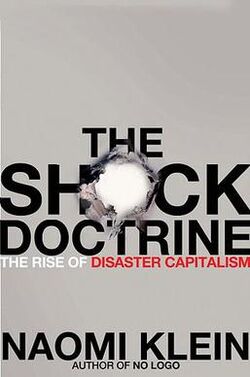Shock doctrine
(economic concept, psychological warfare) | |
|---|---|
 | |
| A deliberate strategy centering on the exploitation of national crises (disasters or upheavals) to establish controversial and questionable policies, while citizens are too distracted (emotionally and physically) to engage and develop an adequate response, and resist effectively. |
The Shock Doctrine: is an often used strategy described and given name by the Canadian author and social activist Naomi Klein in her 2007 book of the same name.
In the book, Klein argues that neoliberal free market policies (as advocated by the economist Milton Friedman) have risen to prominence in some developed countries because of a deliberate shock strategy. This centers on the exploitation of national crises (disasters or upheavals) to establish controversial and questionable policies, while citizens are too distracted (emotionally and physically) to engage and develop an adequate response, and resist effectively.
The book advances the idea that some man-made events, such as the Iraq War, were undertaken with the intention of pushing through such unpopular policies in their wake.
Synopsis
Naomi Klein's 2007 book The Shock Doctrine: The Rise of Disaster Capitalism is divided into seven parts with a total of 21 chapters.
Part 1 begins with a chapter on psychiatric shock therapy and the covert experiments conducted by the psychiatrist Ewen Cameron in collusion with the Central Intelligence Agency. The second chapter introduces Milton Friedman and his Chicago school of economics, whom Klein describes as leading a laissez-faire capitalist movement committed to creating free markets that are even less regulated than those that existed before the Great Depression.
Part 2 discusses the use of "shock doctrine" to transform South American economies in the 1970s, focusing on the 1973 coup in Chile led by General Augusto Pinochet and influenced by a prominent group of Chilean economists who had been trained at the University of Chicago in the Economics department, funded by the CIA, and advised by Milton Friedman. Klein connects torture with economic shock therapy.
Part 3 covers attempts to apply the shock doctrine without the need for extreme violence against sections of the population. Klein says that Margaret Thatcher applied mild shock "therapy" facilitated by the Falklands War, while free market reform in Bolivia was possible due to a combination of pre-existing economic crises and the charisma of Jeffrey Sachs.
Part 4 reports on how Klein thinks the shock doctrine was applied in Poland, China, South Africa, Russia, and the Four Asian Tigers. In Poland she discusses how the left-leaning trade union Solidarity won the country's 1989 legislative elections, but subsequently employed the shock doctrine due to IMF pressure. The section on China discusses the 1989 Tiananmen Square Protests, and the liberalization of China's economy. In South Africa she explains that the negotiations to end apartheid resulted in economic policy that went against the core of the Freedom Charter. In Russia she describes how Boris Yeltsin took power after the collapse of the Soviet Union and crafted economic policy that made the Russian oligarchs of 2020 possible. Finally she shows that during the 1997 Asian financial crisis the Tiger Nations were forced to sell off numerous state enterprises to private, foreign companies.
Part 5 introduces the "Disaster Capitalism Complex", a complex series of networks and influence employed by private companies that allows them to profit from disasters. She mirrors this new Disaster Capitalism Complex with the Military Industrial Complex and explains that both employ the blurring of the line between private and public, through tactics like the revolving door.
Part 6 discusses the use of "shock and awe" in the 2003 invasion of Iraq and the subsequent occupation of Iraq, which Klein describes as the most comprehensive and full-scale implementation of the shock doctrine ever attempted, with mass privatization of Iraqi state-owned enterprises (including thousands of men being laid off) which is argued as contributing to the insurgency, since many of the unemployed became embittered toward the US as a result and joined insurgent groups afterward.
Part 7 is about winners and losers of economic shock therapy – how small groups will often do very well by moving into luxurious gated communities while large sections of the population are left with decaying public infrastructure, declining incomes and increased unemployment. Klein describes economic policy after Hurricane Katrina, the 2004 Sri Lanka Tsunami, and the Apartheid-style policy of the Israeli government toward Palestinians.
The Conclusion details the backlash against the "shock doctrine" and economic institutions which, in Klein's view, encourage it – like the World Bank and IMF. South America and Lebanon post-2006 are shown in a positive light, where politicians are already rolling back free-market policies, with some mention of the increased campaigning by community-minded activists in South Africa and China.
References
Wikipedia is not affiliated with Wikispooks. Original page source here